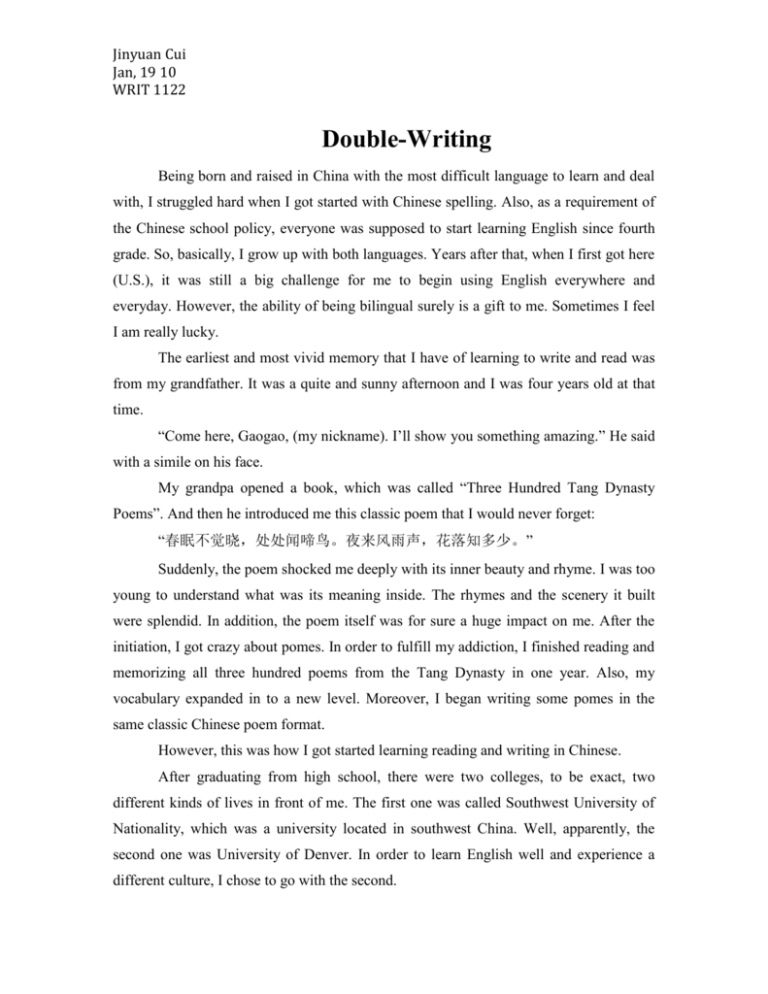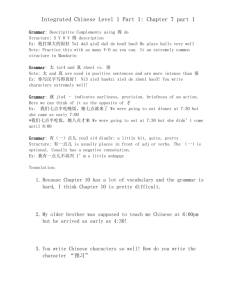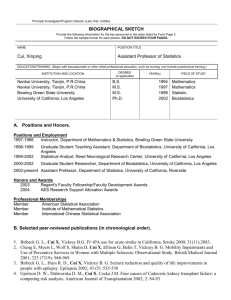CuiLiteracyWriting12
advertisement

Jinyuan Cui Jan, 19 10 WRIT 1122 Double-Writing Being born and raised in China with the most difficult language to learn and deal with, I struggled hard when I got started with Chinese spelling. Also, as a requirement of the Chinese school policy, everyone was supposed to start learning English since fourth grade. So, basically, I grow up with both languages. Years after that, when I first got here (U.S.), it was still a big challenge for me to begin using English everywhere and everyday. However, the ability of being bilingual surely is a gift to me. Sometimes I feel I am really lucky. The earliest and most vivid memory that I have of learning to write and read was from my grandfather. It was a quite and sunny afternoon and I was four years old at that time. “Come here, Gaogao, (my nickname). I’ll show you something amazing.” He said with a simile on his face. My grandpa opened a book, which was called “Three Hundred Tang Dynasty Poems”. And then he introduced me this classic poem that I would never forget: “春眠不觉晓,处处闻啼鸟。夜来风雨声,花落知多少。” Suddenly, the poem shocked me deeply with its inner beauty and rhyme. I was too young to understand what was its meaning inside. The rhymes and the scenery it built were splendid. In addition, the poem itself was for sure a huge impact on me. After the initiation, I got crazy about pomes. In order to fulfill my addiction, I finished reading and memorizing all three hundred poems from the Tang Dynasty in one year. Also, my vocabulary expanded in to a new level. Moreover, I began writing some pomes in the same classic Chinese poem format. However, this was how I got started learning reading and writing in Chinese. After graduating from high school, there were two colleges, to be exact, two different kinds of lives in front of me. The first one was called Southwest University of Nationality, which was a university located in southwest China. Well, apparently, the second one was University of Denver. In order to learn English well and experience a different culture, I chose to go with the second. Jinyuan Cui Jan, 19 10 WRIT 1122 When I arrived DU for the first time, the only good part of my English was the oral. It was a nightmare, as I still remembered, that tons of reading and writing were killing me. As I mentioned before, it was required that English was a must-take subject. Although we had this policy, the problem was that what we had learnt for writing was a not only short but also easy paragraph. My first ligitament paper was for the course BUS 1080, which was called leadership and communication. After the professor told us about the format and the content about this paper, the first idea came to my mind was to seek some help from the instructor. Then, we scheduled an appointment. The professor showed me how the paper was supposed to be written. I planned to spend the whole weekend to work on my first paper, in order to make it as perfect as it could be. With my few knowledge of English writing, one paragraph would take me one or more hour, at least. I thought this could take way too much time, which would make writing this paper a mission impossible. What’s even worse was that the night the paper was due was also the Chinese Spring Festival. After that, I tried to find some help from my Chinese friends. One of them gave me this pretty helpful method, which was to write in Chinese first, and then, try to translate it into English. At that time, this way turned out to help a lot. So it began. When I got the whole thing done, we were having a dinner for the Chinese New Year at my friend’s house. But, here came another question, which was my poor grammar. However, that was really my lucky day. A friend of mine who was super good at translating with magnificent knowledge of English grammar was also there at the dinner. She gave me great help with both translation and grammar. I could never forget how happy and satisfied I was the moment I got this paper done 100%. What’s more, it was such a wonderful new year for me. As a result of being hard-working and the great help from my friends, the paper got an A. After this important paper, my opinion was that I could not go with this translation for the rest of my college career. I began not only writing and speaking in English but also thinking in English, which was a giant step of my college life. Nevertheless, this was the way I learnt writing in English. There is a Chinese saying, “Everything is hard with the beginning part.” I totally agree with it. Many people think being bilingual is great, but they never see the time and Jinyuan Cui Jan, 19 10 WRIT 1122 the effort that one person put into studying both languages. Well, I enjoyed the entire process. Nonetheless, I feel really lucky that I have this chance to learn and live in both English and Chinese. Again, the ability of “double writing” is for sure not only a gift but also a treasure to me. Jinyuan Cui Jan, 19 10 WRIT 1122 Speaking and Writing For those two literacy narratives, due to different modes, the ways I express myself are obviously different. Generally speaking, speaking and writing are a huge part of our daily life. From my point of view, one on hand, the oral is more informal and casual; on the other hand, the written is always not only formal but also more prepared. There are some points I’d like to talk about. First, let’s take a look at some similarities. No matter which mode you are using for expression, there is always an order to follow. The most basic one will be introduction, first point, second point…conclusion. Both papers and articles are based on this order. When you give someone a speech or presentation, you also build your outline and slides in the same way. For my literacy narratives, before I start working on either the audio or the paper, a general outline is a good first step to begin with. If I don’t write down an outline, my whole spoken and written processes will always make my head totally blank. Second, we have the differences. When I did the audio, what I did basically was telling a story from my outline, which was the way I leant how to write from both languages. However, with writing the paper, my story spreads so widely, which makes the entire process more vivid. In addition, a good metaphor will be: the story is the bone and the description from writing will be the meat. Moreover, both together make the story much more energetic and graphic. Next, either way has some advantages. Let’s begin with the oral. From my precious experience with speeches and presentations, the materials are always prepared really well and practices have been done many times. For this one audio, as I mentioned above, I was just telling mu story from the outline. Actually, when I chose this course, I totally was not expecting doing some spoken work; however, I really enjoyed expressing not only my story but also myself in both ways. For the writing, in my opinion, when I was writing my paper, it felt like either drawing a piece of painting or architecting a building. Especially, I enjoyed writing in English; sometimes another idea came just from Jinyuan Cui Jan, 19 10 WRIT 1122 a word. As many people pus it, words give a person a chance to imagine and build the world from the article with personal precious experience. In other words, with writing, it’s more creative. Finally, it comes to limitations. For the audio, one disadvantage I was having was the pronunciation. If I pronounced any word wrong, the listeners would probably be confused about what I was trying to say, which was a huge concern. Anyway, I did my best with the pronouncing part. However, for me, the worst disadvantage of writing I had was my vocabulary. As an international student, I am still learning the English language. Sometimes, instead of variety of words, I used lots of the same ones to describe different objects. Moreover, grammar is also a problem. In some situation, when I tried to use several fragments to form one sentence, grammar always confused me. To sum up, this combination of spoken and written work gives me plenty of creative thinking, which brings me a chance to feel how each way is supposed to work out. Again, from my point of view, one on hand, the oral is more informal and casual; on the other hand, the written is always not only formal but also more prepared. Nonetheless, in my opinion, it seems that the spoken and the written are separate. At the same time, both of them also have some sort of deep connection. Literally, to be honest, I really enjoyed doing both the work.







